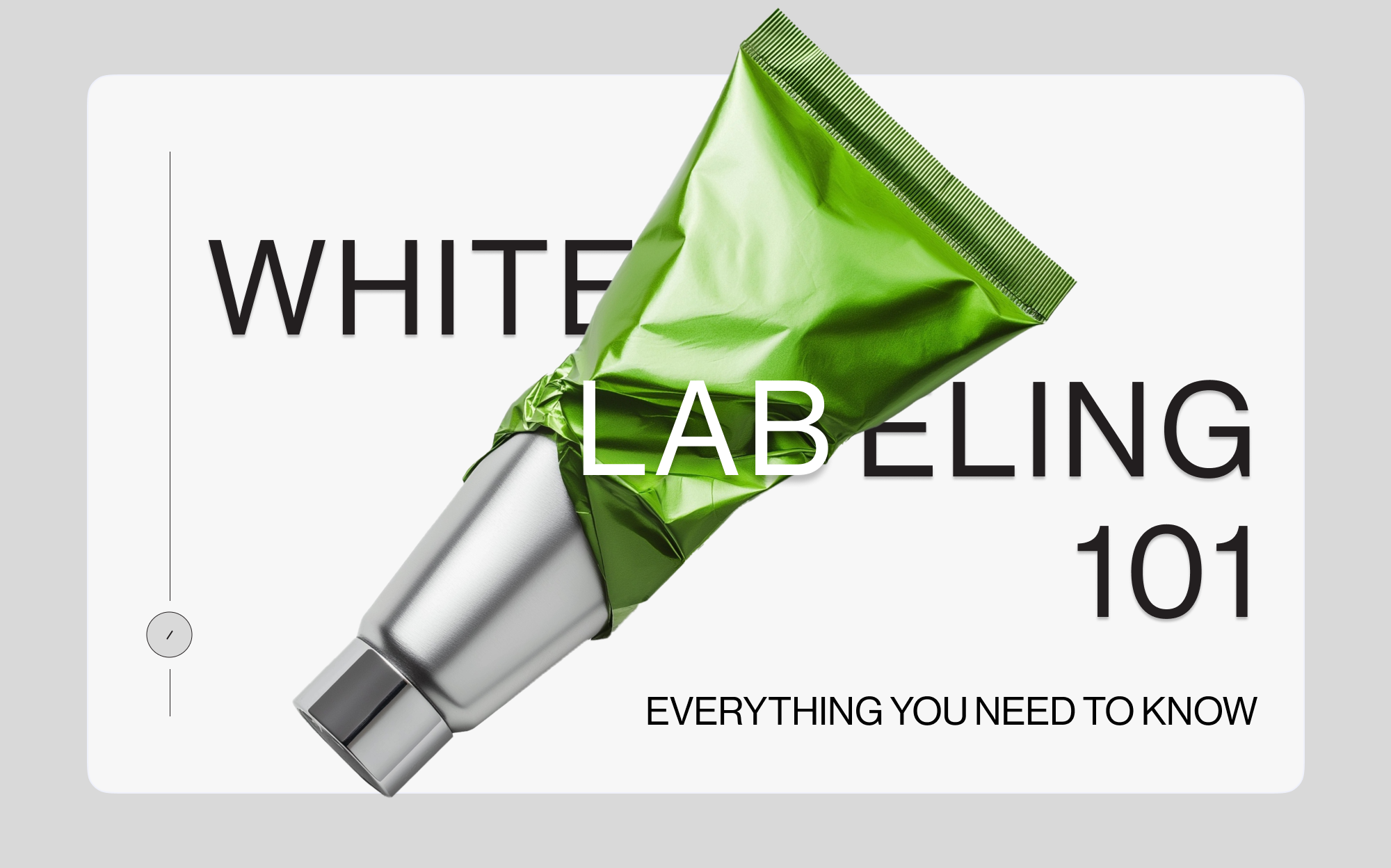
What Is White Labeling and What Are Its Benefits
Want to offer new products without spending years developing them? White labeling lets you take a ready-made solution and sell it as your own. It's how small agencies compete with tech giants and how smart businesses quickly expand their offerings - someone else handles development while you focus on sales and growth. Think of it as your shortcut to launching that new service you've been dreaming about.
What is White Labeling?
White labeling is the practice of one company producing a product or service that other businesses can sell as their own. The original producer remains anonymous, allowing the reseller to market the product under their branding, logo, and identity.
The term "white label" originated from the music industry, where record labels would send white-labeled vinyl records to DJs for promotional purposes or testing, while concealing the artists’ names.
Over time, white labeling evolved far beyond its origins, encompassing everything from software solutions to consumer goods, enabling businesses to offer sophisticated products without building from scratch. As a business model, white-labeling is commonly used in software (website builders, SaaS platforms), consumer goods (e.g., food or cosmetics), and services (e.g., marketing tools or payment systems).
What Does White Label Mean for Your Bottom Line
The white labeling model offers seven compelling advantages for businesses looking to drive additional revenue at minimal cost:
-
Rapid Market Entry: Instead of spending months or years developing proprietary solutions, companies can launch new products or services within days or weeks.
-
Cost Efficiency: By eliminating research, development, and maintenance costs, businesses can focus resources on marketing and customer relationships.
-
Proven Quality: White label products come pre-tested and market-ready, reducing the risks associated with new product launches.
-
Scalability: Companies can easily expand their product or service line without significant operational changes or infrastructure investments.
-
Enhanced Focus: By outsourcing product development, companies can concentrate on their core competencies – whether that's sales, marketing, or customer service. This specialization often leads to improved overall performance.
-
Competitive Edge: White labeling enables smaller businesses to compete with larger enterprises by offering sophisticated solutions without massive infrastructure investments
-
Revenue Diversification: Companies can easily introduce new revenue streams by adding complementary products or services to their existing offerings, reducing dependency on a single income source.
How White Labeling Works
White labeling operates through a strategic partnership where the first company (the producer) creates a fully-functional product or service that the second business (the reseller) rebrands and sells as its own.
The producer handles all the complex backend development, maintenance, security updates, and feature improvements, and provides the reseller with a customization layer that includes admin dashboards, API access, and branding controls. This setup allows the producer to focus on technical excellence while the reseller deals with marketing, sales, and customer relationships – creating an efficient division of responsibilities that benefits both parties.
For example, in a white label website builder scenario, firms like design agencies typically take a proven website builder and transform it into their own branded product. They customize the interface with their logo, colors, and brand identity, set their own pricing structure, and present it to clients as their proprietary platform. Their clients use what appears to be the agency's own website builder, complete with the agency's branding, support, and pricing, never knowing that the core technology is licensed from another company.
White Labeling in eCommerce
The eCommerce sector has particularly embraced white labeling, with businesses across a range of sectors utilizing white label eCommerce platforms to enter the web development industry.
From design agencies to hosting providers, from tech consultancies to SaaS platforms - white label eCommerce is transforming how companies serve their business clients.
White label eCommerce solutions provide a complete toolkit for building and selling online stores under your own brand. If you're a consulting firm, you can offer it as part of your digital transformation package. If you're a hosting provider, you can bundle it with your existing services. If you're a SaaS company, you can integrate it into your platform. The platform handles all the complex parts - shopping carts, payment processing, inventory systems, security updates - while you focus on your unique value proposition. Your clients get a sophisticated online store, and you get to expand your service offering without massive investment in development.
Typically, white label eCommerce solutions are built around a core eCommerce website builder offering features like customizable storefronts, inventory management systems, a range of supported, products (including event tickets, rentals, subscriptions, digital products, etc.), multiple payment and shipping options, free SEO and marketing tools, eCommerce-optimized website templates, and more.
Should Your Business Use White Labeling?
White labeling isn't just about finding a provider and reselling their product. It's about understanding how this model will reshape your business operations, client relationships, and growth trajectory.
Key Evaluation Factors
-
Market Alignment: Look beyond simple demand metrics. Study your target market's pain points, buying behaviors, and willingness to pay. Map out your competitors' offerings and identify gaps you could fill. Most importantly, determine if your clients would value having this solution as part of your service package. Ask yourself: what does white label mean in marketing your products and services?
-
Customization Depth: Provider flexibility varies dramatically. Some offer basic branding changes, while others allow deep functional customization. Evaluate whether you can adapt the solution enough to deliver unique value to your clients. Consider both current needs and future requirements - can the platform grow with your clients' demands?
-
Support Infrastructure: Success with white labeling depends heavily on the support ecosystem. Examine the provider's technical documentation, training resources, and support response times. Check if they offer dedicated account managers, developer support, and regular platform updates. Your ability to serve clients effectively will dependd on this backbone.
-
Financial Model: Look past the obvious profit margins. Calculate total costs including integration, training, marketing, and ongoing maintenance. Consider the provider's pricing structure - do they take a percentage of sales or charge flat fees? Project different revenue scenarios based on various client types and usage patterns.
-
Integration Capabilities: Your white label solution needs to play well with existing systems. Assess API quality, data migration tools, and third-party integration options. Consider your clients' tech stacks too - will they be able to connect the solution with their current tools?
-
Exit Strategy: This often-overlooked factor can be crucial. Understand how client data can be exported, what happens to customizations if you switch providers, and how you would manage the transition. Having a clear exit path gives you negotiating power and risk protection.
How to Get Started
Before diving into selection and implementation, you need a clear roadmap. Most businesses fail at white labeling not because of the technology, but because they rush in without proper planning. Here's your practical guide for getting started.
-
Map Your Marketing Vision: Get crystal clear on how you'll package and sell the white label solution. Will you bundle it with existing services? Sell it standalone? Which client segments will you target first? What price points make sense for your market? Write this down - it'll guide every decision that follows.
-
Choose Your White Label Provider: Don't just compare features and prices. Look at their track record, financial stability, and client support. Ask tough questions: How often do they release updates? What happens if something breaks? Can they handle your growth? Request detailed case studies and talk to their existing clients.
-
Plan Your Integration: This is where reality hits. You need a solid technical plan for integrating the white label solution into your business. Think about your branding requirements, how you'll handle customer support, what training your team needs, and how you'll manage client onboarding. Create a timeline with clear milestones.
-
Set Up Your Revenue Model: Decide on your pricing structure and profit margins. Consider different tiers of service, subscription models versus one-time fees, and volume discounts. Build in room for adjustments as you learn what the market will bear. Remember to account for all costs, including provider fees, support, and marketing.
-
Establish Success Metrics: Define what success looks like beyond just sales numbers. Track client satisfaction, support ticket resolution times, client retention rates, and upsell opportunities. Set up regular reviews to assess performance and adjust your strategy based on real data.
Getting Started with Ucraft's White Label Solution
Launching your white label eCommerce business with Ucraft is remarkably straightforward. The platform offers three flexible partnership models, each designed for different business scales. Freelancers can start with a single workspace at $24/month, agencies can scale up to multiple projects at $42/month, and SaaS companies can manage larger operations at $159/month. Each tier includes Google hosting, multiple demo projects, and unlimited trial days to perfect client projects.
Getting started requires no technical expertise or development team. You'll receive access to a Partner Dashboard that centralizes all operations - from client billing to project management. The platform includes professionally designed eCommerce templates, AI-powered tools for rapid store creation, and built-in billing systems for client payments. Most importantly, Ucraft provides 24/7 priority support specifically tailored for white label partners, ensuring you're never stuck when building client stores.
To begin the process, simply book a demo - the Ucraft team will handle all technical implementation and setup from there.
Conclusion
White labeling represents a strategic opportunity for businesses to expand their offerings while maintaining focus on their core competencies. By carefully selecting the right white label partnership and maintaining high service standards, companies can leverage this model to accelerate growth and enhance their market position.
Whether you're a digital agency looking to scale your web development services or an entrepreneur seeking to launch an eCommerce platform, white labeling offers a practical path to achieving your business objectives without the overhead of traditional product development.
Frequently Asked Questions
What is the basic white label definition?
At its core, white labeling means taking a fully developed product, rebranding as your own it and selling it to your clients.
What does white label mean in business?
White labeling represents a strategic partnership where one company creates a product or service that other businesses sell as their own. This allows companies to expand their product and service offerings quickly and efficiently while maintaining complete control over client relationships and pricing.
What's the white label meaning for different types of businesses?
Different businesses interpret white labeling differently based on their needs. For agencies, it means offering additional services without expanding their development team. For SaaS companies, it means integrating new features into their existing platform. For consultancies, it means providing complete digital solutions to their clients.
How to choose a white label provider?
Look for providers with strong technical infrastructure, comprehensive customization options, reliable support systems, and clear pricing models. The provider should also offer thorough documentation, training resources, and a proven track record of platform stability and updates.
How much does a typical white label platform cost?
White label solutions are priced to fit different business scales, and can start as low as Ucraft's $24/month subscription. Most providers offer tiered pricing with different levels of features, support, and client allowances.
Remember that you can recover these costs by setting your own pricing for end clients.
Related posts
446,005 entrepreneurs like you already have a head start
Become one of them by getting world-class expertise delivered into your inbox, for free.











